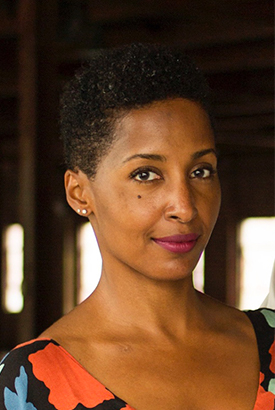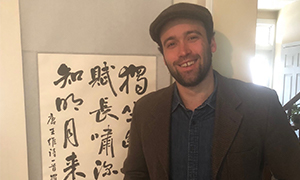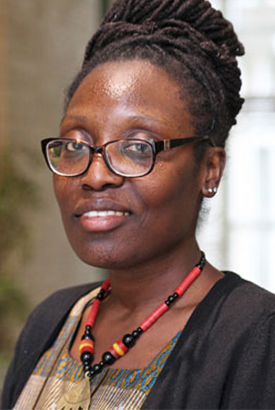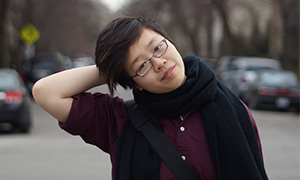The Garden: Volume One
Uniquely Connected & Thriving Together at Dietrich College
In This Issue: Planting the Seeds: Frank M. Dolce | Neighborly Greenhouse | Gardening Tools for Faculty | Gardeners of CMU: Interview with Dr. Mame-Fatou Niang | Events | Sprouting Opportunities: Pre-Law Internships | Op-Ed by Phuong Ngoc Dinh
 A Message From Ayana Ledford
A Message From Ayana Ledford
Associate Dean for Community Impact and Educational Outreach, Dietrich College of Humanities and Social Sciences
Our unique attributes make us strong as a community. They enhance our learning experience by exposing and challenging us to consider, weigh and value the thoughts, background and practices of others different from ourselves. I would like to welcome you to The Garden, a newsletter dedicated to highlighting Dietrich College initiatives that are designed to help us cultivate excellence and foster inclusion. Similar to a garden, members of our community are vibrant, complex and require nurturing. It is my hope this newsletter will help you to become better connected, provide opportunities for you to get involved and learn from individuals that may see the world through a different lens. While I want to acknowledge that there is still a lot of work to be done, I am confident our community will continue to flourish!
Planting the Seeds: Frank M. Dolce
Frank M. Dolce (杜启天), a Ph.D. candidate in second language acquisition, is currently developing "Banter," an app that connects students with peers who have overlapping interests. While the app was first conceptualized to bridge the invisible gap between international and domestic students on college campuses, Dolce envisions a yet deeper function.
 "Universities have been looking for a way to serve as a sanctuary for minorities. This app is a way to do that,” he said. “We view this app as having a social justice role and as being beneficial for everyone. You need to have friends who are diverse speakers, involved in diverse communities of practice. There’s a term in Chinese, 抱 as in ‘to hug,’ and 团 as in ‘group.’ Together, it describes sticking to your own group to the point of ignoring all else.”
"Universities have been looking for a way to serve as a sanctuary for minorities. This app is a way to do that,” he said. “We view this app as having a social justice role and as being beneficial for everyone. You need to have friends who are diverse speakers, involved in diverse communities of practice. There’s a term in Chinese, 抱 as in ‘to hug,’ and 团 as in ‘group.’ Together, it describes sticking to your own group to the point of ignoring all else.”
Students are empowered to expand their social circles and create a more dynamic campus community with interactions between international students and those who are interested in “languacultures” other than their own. The beta version gives access to anyone with a CMU email, and Frank hopes this app will become something the whole community can use.
Neighborly Greenhouse
Neighborhood Learning Alliance (NLA) is a Pittsburgh nonprofit dedicated to improving the education and opportunities of African-American and lower income families by partnering with community, educational and faith-based organizations. From the Reaching Back Male Mentoring Program to the Little Learning Warriors afterschool programs, NLA seeks to put into practice their vision of thriving children, families, and communities.
Carnegie Mellon students in work-study programs have served as tutors and mentors in the organization’s high school and college programs. CMU students have also assisted partner elementary and middle schools, helping students learn to read and do homework. Those hired outside of work-study are paid at the same rate. “CMU has always been supportive of our program. Particularly over the summer, CMU students have been amazingly helpful," Executive Director Stephen Macisaac. "Certainly they could volunteer, especially CMU students of color, as one-offs or occasionally. Our work is on building kids’ academics and their aspirations. So often are students of color not able to see role models who look like them, and it’s important that they know people they can aspire to.”
Get involved and make a substantive change in Pittsburgh by applying to volunteer.
Gardening Tools for Faulty
CMU’s Eberly Center for Teaching Excellence and Educational Innovation, in collaboration with Ayana Ledford, director of diversity and inclusion for Dietrich College, has designed microteaching seminars for faculty to tackle questions around how to uplift communities of learners and challenge students without motivating unhealthy competition. Each seminar is evidence-based, only 30 minutes and can be conducted at a departmental level. Topics include, “Teaching and Reaching All Students,” “Motivating Students by Promoting a Growth Mindset,” “Reducing Barriers to Achievement” and more.
To request a seminar for your department, please contact Chad Hershock, director of faculty and graduate student initiatives.
Gardeners of CMU: Interview with Mame-Fatou Niang
Mame-Fatou Niang, assistant professor of french and francophone studies, is organizing the symposium, “Blackness, Citizenship and the Arts” on Friday, Mar. 23, 2018, from 9:00 p.m. to 5:00 p.m. The symposium will be composed of discussions on the effects of globalization, citizenship and increasing nationalism in black communities.

Two events on Thursday, Mar. 22, 2018 will precede the symposium: the opening of the photo exhibit “Black, Muslim and French” and a screening of the documentary, “Mariannes Noires: Afropean Mosaics,” which is a second iteration of the Dietrich College Honors Fellowship thesis from Kaytie Nielsen (DC’16).
Inspired by calls in the French minority communities for recognition of new forms of Frenchness and the tensions that intersect national and ethnic identities, Niang searched for a way to link similarities in the challenges that Black communities faced in Paris and Pittsburgh. She discovered an extremely active, vocal “nucleus of artists and community actors [who] were trying to make sure that, in the euphoria of the economic boom, Pittsburgh does not forget its Black population.” Fifteen of those award-winning visual artists, filmmakers and researchers come together in this symposium to speak on the roots and manifestation of social inequality and discrimination.
What inspired you to construct this symposium?
The symposium (on the 23rd) grew naturally from the March 22nd screening of Mariannes Noires. Initially, I just wanted to organize the screening then thought that it would be powerful to extend the post-screening Q&A and make it an event with the audience, artists, researchers and community activists. The daylong conference will enable all these constituents to come together and engage in fruitful exchanges.
Is there a social, political or cultural context that you want to highlight for viewers and listeners?
My work examines the development of French identities. Afro-French studies, ethnic studies in general, are a very new topic in France. The French Republic’s color-blind stance denies any identity-claim made on racial grounds. The preamble to the constitution proclaims the equality of all citizens regardless of their religion, origin or race. But, erasing race from official documents and public life does not miraculously erase racism and racial disparities. Increasingly, voices are arising within French minority communities, some of which have a history with France spanning many centuries. People are calling for more diversity in the elaboration of the national mosaic, as well as the formal recognition of new forms of Frenchness rooted in hybridity and ethnic diversity. My work on the Afro-French community seeks to shed light on the inevitable tensions that lie at the crossroads of national and ethnic identities. In France, art has played and continues to play a central role in the definition and the limits of citizenship. So, I am very interested in looking at Afro-French artists and authors as architects of new identity paradigm.
Living in Pittsburgh, I have been witnessing some of the issues that are affecting the black communities here, from the rapid gentrification in East Liberty, to the social and economic challenges that are falling on communities in the Hill District or Wilkinsburg. I was very interested in the fact that a rather small, but extremely active nucleus of artists and community actors were very vocal, and were trying to make sure that, in the euphoria of the economic boom, Pittsburgh does not forget its black population.
Looking at these very different places, Paris and Pittsburgh, I was able to highlight a variety of similarities in the challenges that black communities faced in these cities, and the ways in which art was used, not only as a mean to denounce racism and racial inequalities, but also as a medium through which black communities were adding to the life of these two cities.
What takeaways do you want students to have?
I want students to attend because there is an amazing line-up of award-winning visual artists and filmmakers, as well as great researchers. No, more seriously, the events are free and open to the public. We want to talk openly about roots and manifestation of social inequality and discrimination. The audience is an integral part of a project, which aims at building bridges across oceans, race, groups, occupations and disciplines. I am looking forward to seeing a rainbow of backgrounds, experiences and perspectives come together.
In my opinion, humanity’s salvation will lie within our capacity to come together as we weather the storms of injustice and extremism that are gripping community globally. I want students, youngsters to be active participants in the debates and bring in a diverse range of voices. That will be both a contribution and a take away: knowing that they can be active participants in this conversation.
Are there any ways for faculty and students to get involved after the symposium concludes?
I want students to comment, participate and ask as many questions as they can and/or want during the symposium. After the event, or for those who needed the time to process their thoughts, I would like for the students to take these conversations to their respective classrooms, dorms, exchange with themselves and their professors, in short, extend the symposium into their familiar circles.
Learn more and see the full schedule of events.
Events
Ready to Bloom: Eggs Everywhere Potluck on Friday, Apr. 13, 7:00 p.m.
The Eggs Everywhere Potluck will be held at Clyde House, 624 Clyde Street, Pittsburgh, PA 15213, where attendees are encouraged to bring an egg-based dish from their culture and to also have the opportunity to sample dishes from around the world. Space will be available earlier in the afternoon for food preparation, and funding is available to subsidize the cost. Please register prior to the event, and contact event organizers Jay Liu and Anjie Cao with any questions or concerns.
Already Bloomed: 20th Annual Summit Against Racism
On Saturday, Jan. 20, a group of CMU students attended the 20th Annual Summit Against Racism, a flagship event for Pittsburgh organizers and community members to discuss racial injustice, how it manifests and how to combat it at the local and systemic level. The day-long event took place at the Pittsburgh Theological Seminary with over 800 attendees from diverse backgrounds.
According to attendee Kevin Jarbo, a Ph.D. candidate in psychology, “It was important that the conversations that happened at the event were about racial healing. Part of what it means to be ‘woke’ is to understand the roots of people’s actions and what people think and do as oppressors. These conversations need to happen; racial healing needs to happen.” Jarbo also noted the need for local universities to integrate themselves into the city and to encourage students to engage with the Pittsburgh community through avenues such as the Summit.
To learn more about the movement and related volunteer opportunities, visit the Summit Against Racism.
Learn more about these and other upcoming diversity and inclusion related events
Sprouting Opportunities: Dietrich College Pre-Law Internships
The Dietrich College Pre-Law Internship Program provides undergraduate students with meaningful law internships that directly expose them to a professional work environment in social justice. This program allows students to gain valuable skills while aiding in meaningful advocacy work as they explore career paths.
Sample of placements include:
To apply for the program, email Irene Sun by Friday, Apr. 6, with a 3-page PDF containing: resume, three professional references and a 250-word personal statement on why you would like to participate in this program or why you would like a law internship. Funding is also available.
Irene Sun spearheaded this program under Ayana Ledford and Joseph Devine’s guidance. Sun worked as a law intern for the City of Pittsburgh Department of Law and directly assisted the assistant city solicitor with civil rights cases.
“It was an awesome experience to see exactly what type of lawsuits the city is involved in and directly help with these cases. I did a lot of memo writing and deposition reading, which I feel has made me a more interpretive and fluent writer overall,” said Sun, a senior violin performance major with a minor in international relations and politics. Sun is also a research associate at the Center for International Relations and Politics at Carnegie Mellon University.
Aileen Tan, another CMU student, spent the summer interning at the Women's Law Project and called it “one of the best summers of my life.” As an intern, she enjoyed weekly court visits and being able to watch the judge up close.
"Not only did I gain legal practical skills such as drafting affidavits, but I also had the opportunity to work with fantastic people and make lasting connections,” said Tan, a senior majoring in statistics.
Op-Ed
Digging Through The Weeds... of Campus Diversity by Phuong Ngoc Dinh
 Diversity and inclusion efforts on the CMU Pittsburgh campus have built momentum in recent years, from a Tartan op-ed calling for institutional support of campus diversity and another Tartan op-ed expressing concern toward faculty’s disengagement from conversations of racial justice to the grand opening of the Center for Student Diversity and Inclusion in Fall 2017. Yet, there remains an issue often swept under the rug: the recruitment of Black, Latinx and Hispanic students.
Diversity and inclusion efforts on the CMU Pittsburgh campus have built momentum in recent years, from a Tartan op-ed calling for institutional support of campus diversity and another Tartan op-ed expressing concern toward faculty’s disengagement from conversations of racial justice to the grand opening of the Center for Student Diversity and Inclusion in Fall 2017. Yet, there remains an issue often swept under the rug: the recruitment of Black, Latinx and Hispanic students.
According to the University Factbook 2017-2018, 4.2 percent of undergraduate students across campus identify as Black only; the corresponding figures for master’s students and doctoral students are 2.0 percent and 1.1 percent. Hispanic students are in no better position: only 2.2 percent of undergraduates, 0.6 percent of master’s, and 0.2 percent of doctoral students identify as Hispanic. And we have no statistics on students who identify as Latinx or mixed-race Black. Notably, these figures have not shown much improvement since 2007. Why are we not successful in recruiting Black, Latinx and Hispanic students? How can we do better?
Phuong Ngoc Dinh is a Ph.D. student in the Department of Psychology.